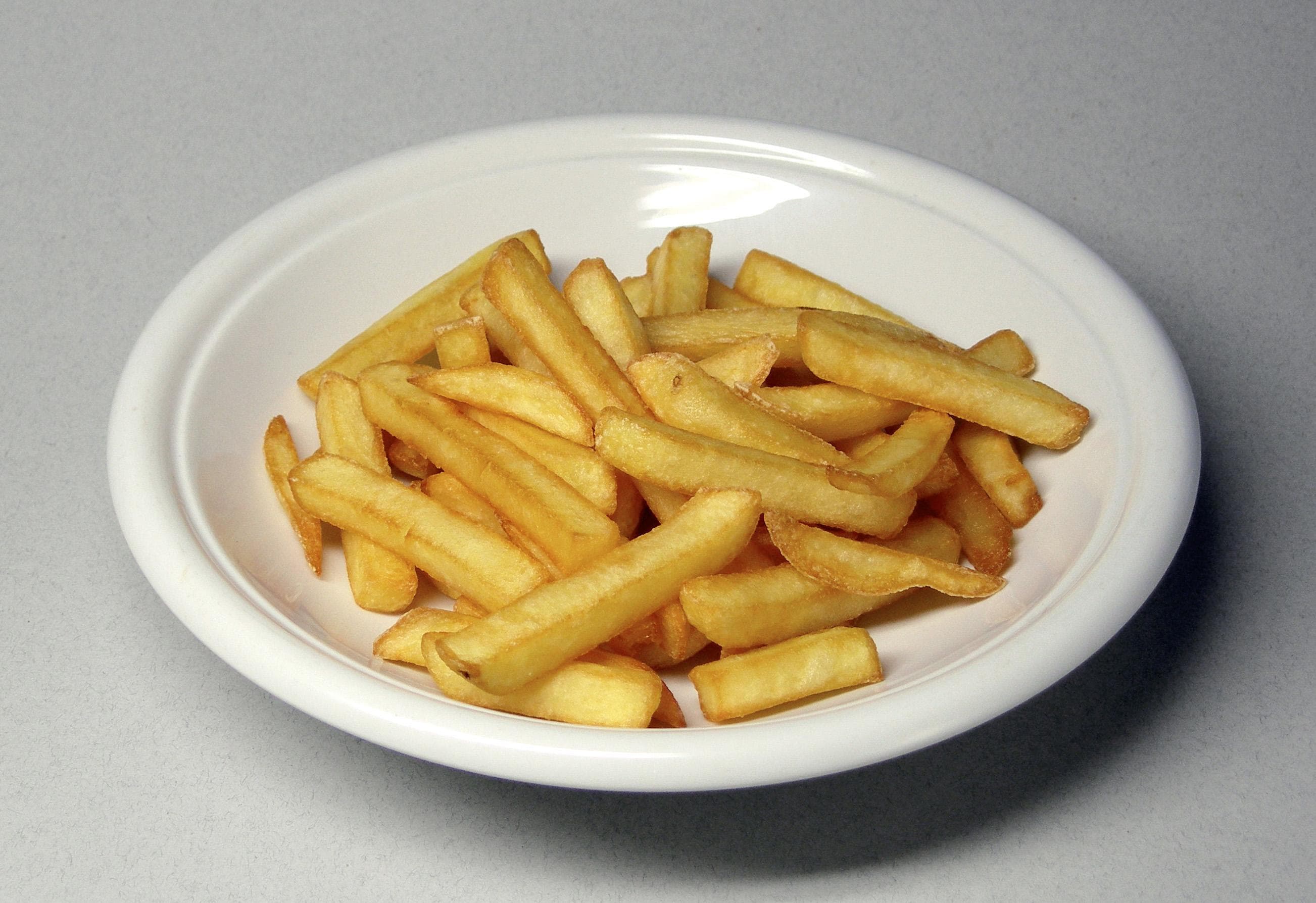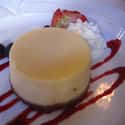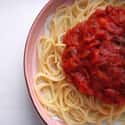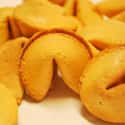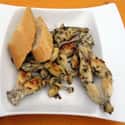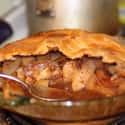-
(#8) Cheesecake
- Dish
The Dish: Cheesecake
Where People Think It Comes From: New York
While not entirely a national dish, cheesecake is a food that many parts of the United States claim as their own. In New York, a distinct type of cheesecake is attributed to Arnold Reuben - also the inventor of the famed Reuben sandwich. In contrast to the soft cheesecakes found in Europe, Reuben produced a cream cheese-based version in 1929.
Where It Actually Originated: Europeans have been making cheesecakes for centuries - something the Greeks and Romans before them did, as well. Cheesecakes in ancient Greece were made with cheese curds and honey, while Roman cheesecakes - called placenta - would have crusts or be crafted into loaves.
-
(#1) 'Red' Spaghetti Sauce First Appeared In A French Cookbook In 1797
The Dish: Pasta and red sauce
Where People Think It Comes From: Italy
Pasta dishes have long been associated with Italy and, in truth, many of the sauces found atop a pile of noodles trace back to ancient Rome. The Roman culinary book known as Apicius includes numerous creamy, white, and wine sauces.
Where It Actually Originated: The tomato wasn't even introduced to Italy from South America until the 16th century. The first cooked tomato recipe didn't appear in an Italian cookbook until the early 19th century.
It's been a relatively recent development, however, that diners could enjoy the traditional red sauce that dominates restaurants and grocery store shelves today. The first red-sauced pasta recipe was written in a French cookbook from 1797, establishing a foundation for derivatives like Bolognese, marinara, and others.
-
(#7) The Origins Of Fortune Cookies Are Japanese, Not Chinese
The Dish: Fortune cookies
Where People Think It Comes From: China or the United States
Cracking open a fortune cookie at the end of a meal in a Chinese restaurant is simply part of the experience. While theories about when and where fortune cookies came to fruition vary, there's one thing scholars agree upon: They aren't Chinese.
One school of thought holds that fortune cookies are part of the Chinese-American tradition, popularized during the early 20th century by Asian immigrants in California. Attributed to both Sumiharu Hagiwara-Nagata, a San Francisco-based landscape architect, and David Jung, a preacher from Los Angeles, fortune cookies were available nationwide by the mid-1930s.
Where It Actually Originated: The prevailing theory is that so-called Chinese fortune cookies are actually Japanese creations. According to researcher Yasuko Nakamachi, fortune cookies were present in Japan during the 19th century, their triangle shapes represented in literary and artistic documents alike.
Japanese baker Takeshi Matsuhisu insists that treats filled with fortunes date back to the 17th century, when "tsujiura senbei," "omikuji senbei," and "suzu senbei" provided fortunes and numerological guidance.
Regardless, there is Japanese precedent for fortune cookies as they exist now. In defense of their association with both China and America, however, Derrick Wong, an executive at one of the leading fortune cookie manufacturers in the world, insists, "The Japanese may have invented the fortune cookie. But the Chinese people really explored the potential of the fortune cookie. It's Chinese-American culture. It only happens here, not in China."
-
(#6) The Earliest Evidence Of Cooked Frog Legs Was Discovered In England
The Dish: Frog legs
Where People Think It Comes From: France
A French delicacy to many, frog legs were also eaten by Dutch and British diners as early as the 17th century. Believed to have been introduced to England by the French, there was a skepticism about the dish among British and American colonists alike. Both groups found French foods to be over-sauced and over-seasoned, a ruse to hide poor-quality fare.
Where It Actually Originated: Brits may have a hard time swallowing a recent archaeological discovery that potentially places the origins of frog legs as a meal on their shores. In 2013, researchers in Amesbury, England, found evidence that ancient Britons were eating cooked toad or frog at some point between 6250 and 7600 BC.
According to researcher David Jacques:
It would appear that thousands of years ago people were eating a Heston Blumenthal-style menu on this site, one and a quarter miles from Stonehenge, consisting of toads’ legs, aurochs, wild boar and red deer with hazelnuts for main, another course of salmon and trout, and finishing off with blackberries.
-
(#10) Apple pie
- Food
The Dish: Apple pie
Where People Think It Comes From: The United States
Associated with American prosperity and patriotism, apple pie didn't get its start in the United States. In fact, it wouldn't be a North American, much less American, dish at all had it not been for European settlers, especially those from England.
Where It Actually Originated: When colonists arrived in North America, they found only one type of apple: crab apples. Thought to be a "poor substitute" for European apples, crab apples were rarely eaten, and were largely used to make cider. As settlers began to cultivate land in North America, they introduced new types of apples, bringing seeds and trees over from Europe.
This could, in theory, be seen as the origin of American pie but, in truth, European settlers were simply baking foods they'd been eating for centuries. An English recipe from 1381 attests to early versions of apple pie, featuring "figs, raisins, pears, and saffron in addition to apples."
The pure number of apple varieties introduced to North America - and the dissemination of seeds by the likes of folklore figure Johnny Appleseed - alongside literary references and advertisements, factored heavily into the connection between apple pie and Americana.
-
(#11) French fries
- Food
The Dish: French fries
Where People Think It Comes From: France
Where It Actually Originated: French fries were most likely the creation of French-speaking Belgians during WWI. According to lore, when American soldiers observed Belgian fishermen frying potatoes, they called the food "french fries" because the men spoke French.
A variant telling identifies Thomas Jefferson as the individual who gave french fries their name, serving "pommes de terre frites à cru en petites tranches," or raw potatoes cut into small pieces and then fried. While French chef Honore Julien prepared the dish for Jefferson's guests, the Founding Father also talked about having eaten the potatoes while in France.
In both France and Belgium during the mid-19th century, fried potatoes were a common street food. It's difficult to know exactly who tried it first.
While one of the most common American meals - a hamburger and french fries - may be a giant misnomer, it gets worse. Ground-beef patties were introduced to the United States by German immigrants in the 19th century, indicating that hamburgers aren't entirely American in origin either. But, to be fair, the hamburger - beef and bun - was allegeldy invented at the World's Fair in St. Louis in 1904.
New Random Displays Display All By Ranking
About This Tool
Nowadays, many national foods are considered to be part of a certain country, although these foods' origins were not there, and even exist in a completely different form in the place of origin, just like the Chinese food you eat in Chinese restaurants in the United States and they are definitely two kinds of Chinese food that China. There are also many other national foods with wrong origins around the world that you may never know.
You could check the random tool if you are interested in the essential national foods whose wrong origins, many people do not know that the red spaghetti sauce first appeared in a French cookbook in 1797, the tool will help you to learn more about interesting foods' history.
Our data comes from Ranker, If you want to participate in the ranking of items displayed on this page, please click here.





